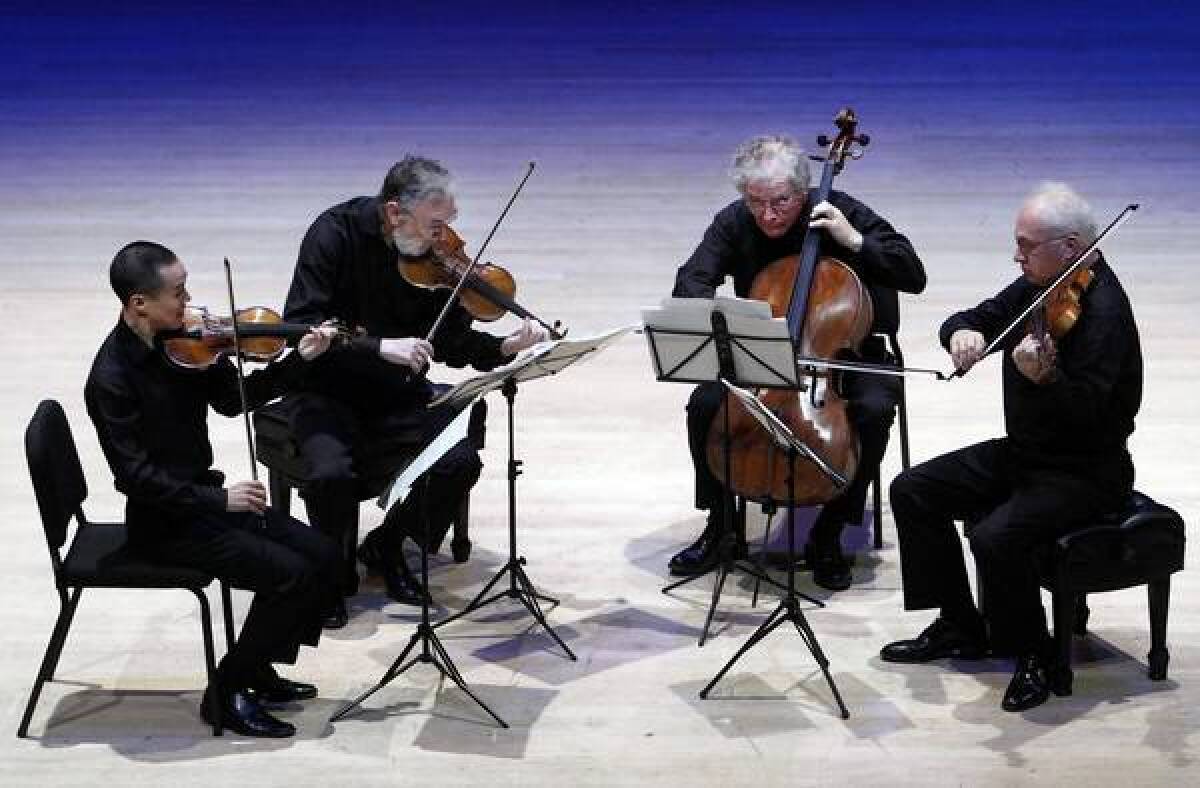Review: A smoother sound from Juilliard String Quartet

While driving to Aliso Viejo on Tuesday to hear the Juilliard String Quartet play Bach, Schubert and a young American composer, Jesse Jones, at the Soka Performing Arts Center, I listened to a little early Bob Dylan. It seemed right. But so might have Leonard Bernstein, Glenn Gould, something from Stravinskyâs Los Angeles years or Aaron Copland. Anything by Miles Davis or Thelonious Monk would have been equally suitable.
All were artists on Columbia Records, and in the â40s, â50s and â60s, all were showing the extraordinary originality of North American music. Collectively, these musicians, with a certain shared sensibility, helped not only define a unique American sound but also provided a vision for the direction of music.
But in its current configuration, the Juilliard, which has just acquired a new violist, has what may be too much history for any quartet to live up to. This is no longer the old Juilliard. Itâs not even the Son of Juilliard but, essentially, a new string quartet with a new sound and a new approach, in which the refined replaces energetic impetuosity.
CHEAT SHEET: Fall arts preview 2013
The propulsively urban original Juilliard launched a chamber music revolution. Formed in 1946, the ensemble played BartĂłkâs then little-known six string quartets as though they were rock ânâ roll, years before there was rock ânâ roll. The Juilliard went on to put the quartets of Schoenberg, Ives, Elliott Carter and many other composers on the radar of listeners everywhere.
What the Juilliard did was inject a brash energy into everything it played. In the late â40s, the group even got its hands on an orgone box, a coffin-like container that was supposed to help you tap into the universal life force proposed by radical psychologist Wilhelm Reich. The fad didnât last long, but Juilliard did find a way to capture a visionary vitality of late Beethoven that proved a revelation at the time. Listen to the recordings and you can still feel it.
The players who came to Aliso Viejo obviously were not those who once squeezed into the cathartic orgone box. There have been four first violinists, five second violinists, three violists and three cellists over the groupâs nearly 70s years. The Juilliardâs founder, violinist Robert Mann, remained half a century. When he retired in 1996, he left the DNA to be carried principally by violist Samuel Rhodes and cellist Joel Krosnick, who joined, respectively, in 1969 and 1974.
And now there is one. Rhodes left this summer, and the Juilliardâs California tour is introducing Roger Tapping, a British violist formerly of the TakĂĄcs Quartet. The quartetâs first violinist, Joseph Lin, has been with the Juilliard for only two years. Ronald Copes became second violinist in 1997.
CRITICSâ PICKS: What to watch, where to go, what to eat
The biggest difference is due to Lin, whose lean, agile and precise playing seems effortless and couldnât be more different than that of Mann, who tore into everything, rarely too worried about intonation. The other big difference is the smoothness of the ensemble. In its heyday, the Juilliard was a dramatic ensemble of individuals who frequently clashed timbrally and displayed a cathartic intensity, as though they were musical characters in an Edward Albee play.
The Soka program began with the first four fugues from Bachâs âArt of the Fugue.â The performance was clean, careful and understated, verging on reverent. For any other quartet, this might have seem unremarkable, but here it was statement. When was the Juilliard ever reverent?
Jones, who was born in 1978 and who studied with Steven Stucky at Cornell, is a composer much championed by Lin. He is also a mandolinist who has appeared on âPrairie Home Companion,â although youâd hardly know that from his String Quartet No. 3, written for the Juilliard and given its premiere in Texas on Oct. 11.
The title of the score is âWhereof man cannot speakâŚâ and the program notes bothered to quote only the composer prospectus on the quartet before he had written it. He said he meant to explore âthe spiritual and literal dimensions ⌠as embodied in certain poetry by Yeats, Aquinas, Lamartine, etc.â His intention was to transcribe inflected speech, sighs and song. He aimed at five movements, and a length of 20 to 30 minutes.
PHOTOS: Arts and culture in pictures by The Times
If there are five movements, they are connected over what turned out to be 34 uninterrupted minutes. The poems remain unspecified. But the sighs and song are there, and the spiritual dimension seems pretty clear. And pretty.
Jones works in eerie microtones, producing glassy surfaces like a mystically still sonic pond onto which he throws pebbles and generates ripples. He employs sliding tones, fluttering effects, modal melodies and, at one point, the Dies Irae theme in pizzicato. One hears bits of Ben Johnstonâs microtonal string quartets and hints of Eastern European holy Minimalism. Itâs an engaging, well-written piece, grit-free.
Finally, Schubertâs big final string quartet, No. 15, was grandly â but blandly â played. In its recording of the work 34 years ago, the Juilliard emphasized Schubertâs harmonic experimentalism and made incessant tremolo figures incessantly unsettling. Rhythmically, the recording sounds like Schubert going on Schoenberg.
Now, the Juilliardâs Schubert has more lyricism, more fluency, more normality and sweep. The cello is prominent, and Krosnick, whose intonation is no longer flawless, offered a fond reminiscence or two of the old Juilliard. In his 70s, however, he probably wonât be with the players too much longer.
We, of course, need to just listen. Change the name, and the new Juilliard would be a satisfyingly old-school quartet. But the old one made history, and itâs hard to get over that.
More to Read
The biggest entertainment stories
Get our big stories about Hollywood, film, television, music, arts, culture and more right in your inbox as soon as they publish.
You may occasionally receive promotional content from the Los Angeles Times.











